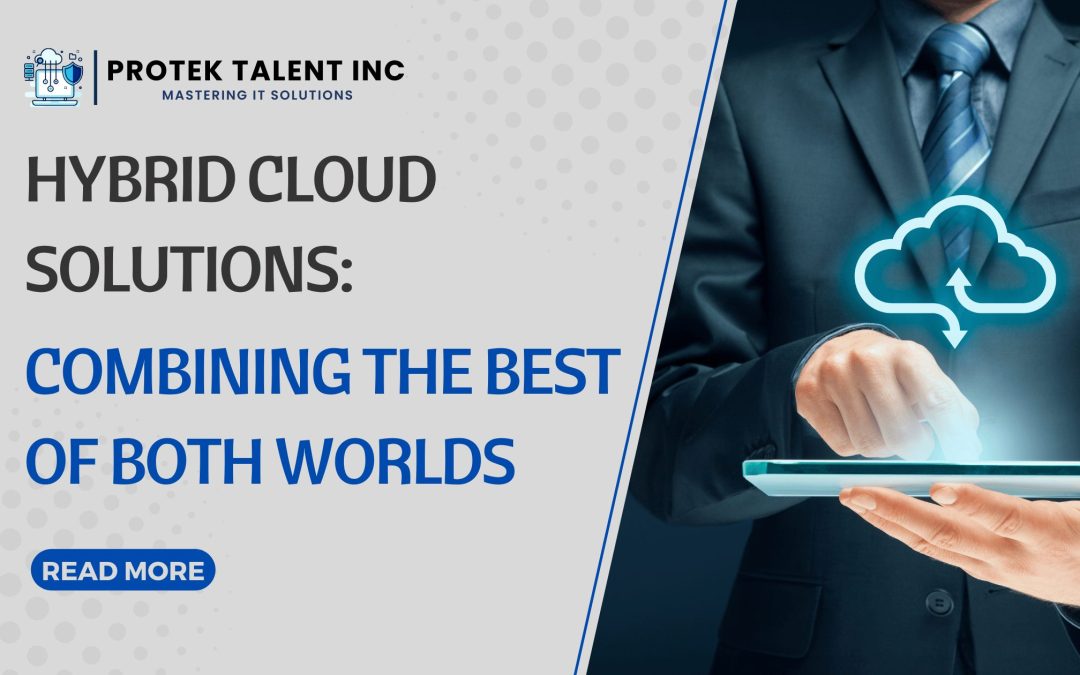In the ever-evolving landscape of cloud computing, hybrid cloud solutions have emerged as a flexible and efficient way for businesses to manage their IT resources. By combining the strengths of both public and private clouds, hybrid clouds offer a versatile environment that can be tailored to meet specific operational needs. At Protek Talent Inc., we understand the strategic importance of hybrid cloud architectures and advocate for their benefits in suitable scenarios. This article will explore the advantages of hybrid cloud setups and identify scenarios where they are particularly effective.
Understanding Hybrid Cloud Solutions
A hybrid cloud is an IT architecture that incorporates a mix of on-premises, private cloud, and public cloud services with orchestration between the two platforms. This setup allows businesses to balance the need for scalability and flexibility with the need for control and security.
Advantages of Hybrid Cloud Setups
1. Flexibility and Scalability
One of the primary benefits of a hybrid cloud is the flexibility it offers. Businesses can keep sensitive data or critical applications on their private cloud or local data center, where they can control security more directly, while leveraging the expansive power of the public cloud for less sensitive tasks or for scaling up operations during peak times. This flexibility enables organizations to adapt quickly to changes in business conditions and market environments.
2. Cost Efficiency
Hybrid clouds allow organizations to optimize their costs by using public cloud resources when it makes sense from a cost perspective. For example, businesses can use the public cloud for high-volume, low-risk tasks such as application development and testing, while reserving their private clouds for high-value, business-critical operations. This approach avoids the expenses associated with maintaining large-scale infrastructure that might only be necessary during peak periods.
3. Enhanced Security
A hybrid cloud model provides enhanced security features by allowing sensitive data to be stored on a private cloud or on-premise infrastructure, which offers more control and customized security protocols. Meanwhile, less sensitive data can be processed in the public cloud where it can benefit from robust security measures at scale, provided by cloud service providers.
4. Compliance and Data Sovereignty
For industries that are subject to strict regulatory requirements regarding data privacy and sovereignty, hybrid clouds offer a viable solution. Organizations can store and manage sensitive data on-premises or in a private cloud to ensure compliance with local laws and regulations, while still enjoying the benefits of the cloud for other aspects of their business.
5. Business Continuity and Disaster Recovery
Hybrid cloud environments enhance disaster recovery and business continuity strategies by allowing data and applications to be replicated in multiple locations (both private and public clouds). This redundancy ensures that if one environment is affected by a disaster, the other can take over, thereby minimizing downtime and data loss.
Ideal Scenarios for Hybrid Cloud Solutions
Regulated Industries
Companies in sectors such as healthcare, finance, and government often face strict regulations on data handling. Hybrid clouds enable these organizations to keep sensitive data securely in private clouds while using public clouds for managing less sensitive information and scalable computing resources.
Businesses with Dynamic Workloads
Organizations that experience significant fluctuations in IT demand (such as retail companies during the holiday season) benefit from hybrid clouds. They can use public cloud resources to handle spikes in demand without investing in permanent infrastructure that remains underutilized during off-peak times.
Organizations Undergoing Digital Transformation
For businesses transitioning from traditional IT infrastructure to cloud-based solutions, hybrid clouds serve as a stepwise approach. They can gradually move workloads to the cloud at a pace that suits their operational needs and risk management preferences.
Conclusion
Hybrid cloud solutions represent a strategic choice for many businesses, providing a balanced approach between performance, cost, security, and compliance. By leveraging the best of both private and public clouds, organizations can achieve greater efficiency and agility in their operations. At Protek Talent Inc., we specialize in crafting customized hybrid cloud strategies that align with the unique needs and goals of each client, ensuring they
harness the full potential of their IT investments. Hybrid clouds are not just a temporary solution but a long-term strategy that can adapt to the evolving technological landscape, ensuring that businesses remain competitive and resilient in the face of changing industry demands and opportunities.

